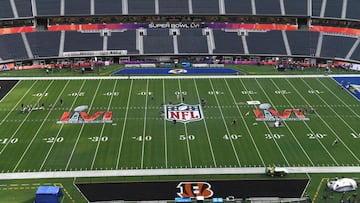How many times has an NFL team won the Super Bowl in their own stadium?
The Los Angeles Rams will seek to make a bit of history against the Cincinnati Bengals in Super Bowl LVI by winning the showpiece in their own stadium.

Super Bowl LVI | Rams vs Bengals live updates
The LA Rams will seek to add a second Super Bowl to their franchise history on Sunday night when they take on the Cincinnati Bengals at SoFi Stadium in Los Angeles and if they are successful, Sean McVay’s side will also become only the second team in NFL history to win the showpiece game in their own stadium (although the Rams are actually designated as the away team for Super Bowl LVI). The only precedent for a home team winning the Super Bowl on their own turf occurred just last year, when Tom Brady led the Tampa Bay Buccaneers to victory over the Kansas City Chiefs at the Raymond James Stadium.
The Rams reached the Super Bowl by defeating the 49ers 20-17 in the NFC Championship game, ensuring that for a second season running one of the two teams in the showpiece game will be nominally playing at home.
As such the Rams, like the Buccaneers before them, have avoided the so-called “home field curse” by which until last year no team had ever reached the Super Bowl when it was being hosted at the own stadium.
‘Twas the night before #SuperBowl. pic.twitter.com/ZkSSA15ssE
— Los Angeles Rams (@RamsNFL) February 13, 2022
The Minnesota Vikings were struck by the curse in the 2017 NFL season, reaching the NFC Championship game against the Philadelphia Eagles only to be trounced 38-7 by the eventual champions, who went on to beat the Patriots 41-33 at Minnesota’s U.S. Bank Stadium.
Rams looking for the love
The Rams will be hoping to win the hearts of Los Angeles sports fans, who are still warming to the franchise after it returned to LA six years ago, in the SoFi Stadium.
The Rams departed in 1995 after 49 years and spent 21 seasons in St. Louis before returning to begin the arduous process of rebuilding a fanbase in LA's crowded sports marketplace.
In their first season back, they managed just four wins as quarterback and number one draft pick Jared Goff struggled. Two seasons later they made Super Bowl LII but their offense failed to fire as they fell 13-3 in a dispiriting loss to the Patriots.
This season, the team shifted firmly into "win now" mode, replacing Goff with the more experienced Matthew Stafford. All-Pro wide receiver Odell Beckham Jr. and Super Bowl MVP linebacker Von Miller were also added to a roster that includes three-time Defensive Player of the Year Aaron Donald and breakout receiver Cooper Kupp.
Now they will look to deliver a championship to the city in the hopes of standing shoulder to shoulder with beloved LA franchises like the Lakers and Dodgers.
The answer to yesterday's question was....C!
— Elias Sports Bureau (@EliasSports) February 8, 2022
Dan Marino threw a touchdown pass in #SuperBowl XIX at 23 years and 127 days old. #FinsUp https://t.co/ZNgvcamMfm
"I think there are a lot of reasons for this city to be excited about this team," Rams head coach McVay said this week. "We've got great players, and it's a fun brand of football that you're seeing them play. LA is a city of champions. They like winners, and that's something that our players embrace and love."
The 49ers precedent
Related stories

How long has Joe Burrow been in the NFL?
Although no team other than the Buccaneers has officially won the Super Bowl in their home stadium, the 49ers were victorious in Super Bowl XIX in January 1985 at the Stanford Stadium, home of college football team Stanford Cardinal and which was selected to host the showpiece game that year as it then had a capacity of almost 90,000 spectators.
San Francisco finished the regular season with a 15-1 record and beat the Giants and the Bears on their way to a showdown with Miami and Dan Marino, crushing the Dolphins 38-16. As the game was played just 30 miles from San Francisco, the 49ers are considered to have played at home in that game. There is a certain logic to it: the 49ers current home, Levi’s Stadium, is 10 miles further away from San Francisco than Stanford Stadium.
